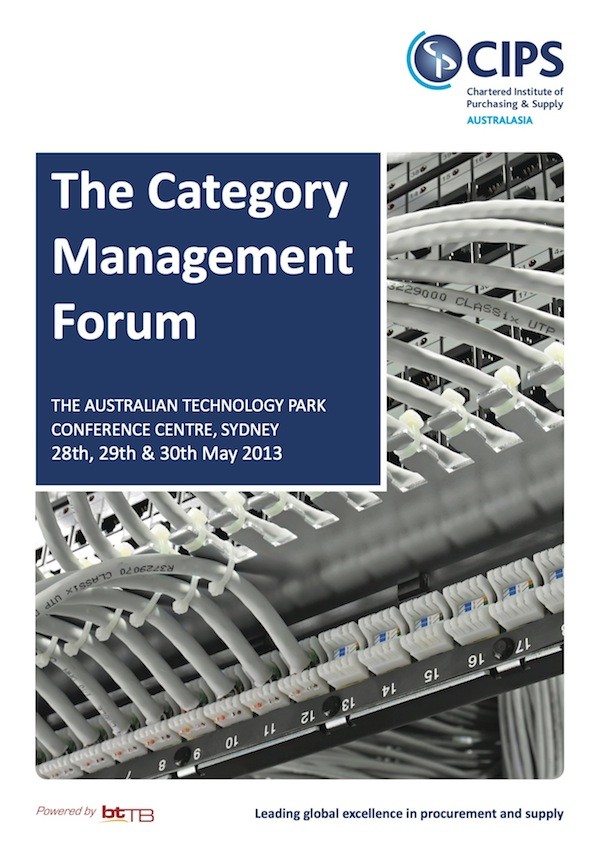Contact Information
Three International Towers, Level 24, Tower 3, 300 Barangaroo AveSydney, NSW 2000
Australia
Social:
Darren Woolley
Founder & Global CEO
Basic Info
Founded in: 2000
Employees: 20
Founded in: 2000
Employees: 20
TrinityP3
Three International Towers, Level 24, Tower 3, 300 Barangaroo AveSydney, NSW 2000
Australia
Darren Woolley
Founder & Global CEO
Buyers and Sellers on selecting agencies and managing their performance
This post is by Darren Woolley, Founder of TrinityP3. With his background as analytical scientist and creative problem solver, Darren brings unique insights and learnings to the marketing process. He is considered a global thought leader on agency remuneration, search and selection and relationship optimisation.
In this, the third and final post from the recent CIPSA Category Management Week held in Sydney, we look at the issues surrounding the agency selection process and the management of the agency relationship and performance.
The two previous posts looked at Agency remuneration and third party costs in marketing procurement and The role of procurement in unlocking marketing value.
Two members of the conference panel were particularly forthcoming on the issues and represent each side of the transaction or partnership.
- THE BUYER – Marketer – Jon Bradshaw, Director, Brand Traction (JB – on the right below)
- THE SELLER – Creative Agency – Paul Williams, Group CEO, BWM Group (PW – on the left below)
 Representing the BUYER or MARKETER and the SELLER or AGENCY they provided insights into the following issues:
Representing the BUYER or MARKETER and the SELLER or AGENCY they provided insights into the following issues:
Agency Tenders
- How effective are open tenders in selecting agencies?
- What is your opinion of RFPs, RFTs and the like?
- What do you believe is the best way to select agencies?
- What things should you not do in selecting agencies?
- What are the typical costs associated with participating in tenders?
Agency Contracts
- Should advertisers own all IP?
- With many companies moving to 75 day and longer payment terms, what is the impact?
Agency Performance Management
- Is it important to implement a performance process?
- What KPIs or SLAs or performance metrics do you recommend?
- Do you prefer objective or subjective measures?
- Should agency performance be linked to remuneration?
AGENCY TENDERS
How effective are open tenders in selecting agencies?
PW – They can be good, but are fraught with issues. They are highly expensive, and do not reflect the working partnership you will get day to day.
What is your opinion of RFPs, RFTs and the like?
PW – While for some companies there is no way around them, many are ridiculously onerous and time consuming.
What do you believe is the best way to select agencies?
PW – Build a relationship prior to pitching. Get to know their work, their people, their track record, their references. Would you pick your gynaecologist by a pitch?!
What things should you not do in selecting agencies?
PW – Ask for IP transfer if not successful! Make the task too onerous or complex… that’s what’s supposed to be solved when you work together.
What are the typical costs associated with participating in tenders?
PW – A typical creative pitch can cost 70- 100k in time costs… and much more if out of pockets are involved. It’s a huge commitment.
JB – Like all selection processes tendering, RFPs and Pitches are flawed. The best attempt to replicate the actual ‘working together’ process in microcosm. Actually the more rigorous, expensive and detailed the process, the better the likelihood of success.
At the end of the day success for a client agency relationship is a combination of relationship and results. One without the other will not succeed. The secret is balancing the desire for certainty against those factors, with the need for speed and efficiency.
My experience tells me that the risk is not spending enough time and effort in selection, not the reverse. That can make the process long and expensive for all concerned. Viewing through the lens of ‘Will we form a 5 – 10 year business partnership?’ should make that pain easier to stomach.
AGENCY CONTRACTS
Should advertisers own all IP?
PW – Only if the agency has been fairly remunerated. But it’s a good idea to effect.
JB – It’s hard to argue that the agency owns the IP, when the client pays for all aspects of its production. In no other industry would someone expect to own something when someone else paid for the conceptualisation and production.
Until we can find a way where the risk of advertising is borne by the agency – and those risks run to many millions of dollars – then my view is the client retains the IP. I really don’t understand this debate. The only IP an agency can own is its talent management and idea creation processes. The rest is manufactured on commission by the client.
With many companies moving to 75 day and longer payment terms, what is the impact?
PW – You’ll have problems with smaller agencies… they have limited funds. Most will and should ask for bank interest rates to be baked into the terms. Agencies should not be treated as financiers.
JB – Smart agencies will build in a cost of credit to their fees. Transparent or hidden. Less smart ones will be less profitable. It’s just another way for clients to extract value. A point of negotiation. Common in all industries.
Is it important to implement a performance process?
PW – Yes… it helps to have a regular 2-way dialogue on the health of the relationship and to identify ways you can help each other improve the partnership. It also helps nip teething problems in the bud.
What KPIs or SLAs or performance metrics do you recommend?
PW – Align them with those of your marketing team. Try to give the agency KPIs that it can actually have maximum effect on… not those beyond its control or remit.
Do you prefer objective or subjective measures?
PW – Objective primarily.
JB – I prefer a mix of measures across relationship and results. Have we delivered great work together? Did we do it in a way that we’d all be excited to repeat? Any agency / client contract that isn’t strong in both areas will ultimately fail. The real issue is that the whole process is almost always set up in favour of the client, as the owner of the ultimate sanction.
Whilst many of the well known processes purport to be about client and agency performance I have rarely met an agency CEO who feels it is genuinely a two way process. Once this process is linked to agency remuneration, all pretence of a two way dialogue is gone. The issue is not with the process, but with the way it’s enacted.
Agencies spend much time and effort getting to know a client’s business. Clients, myself included, historically spend significantly less time trying to understand an agency’s problems. Understandable in a buyer / seller relationship. Normal even. But the best way to build long-term partnerships? Maybe not.
Should agency performance be linked to remuneration?
PW – Its extremely hard to isolate the effects of an agency from all other elements of the marketing mix. So most PBRs don’t work… or are hard to implement.
PBRs work best if an agency puts at risk a portion of its profit margin, in return for the opportunity to make a good upside for achievement of KPIs. Recognise the margin is actually slim so to do so should afford significant opportunity.
JB – An element of risk and reward is always healthy. But given how hard it is to attribute the business impact of any single agency’s work, it’s difficult to see how this can become a major part of remuneration. For either side. In my experience I have rarely seen an agency work harder or do better work because of the performance related element.
The practice I see more often by agencies is a ‘writing off’ of the performance element and then selling behaviours to find other ways to replace the revenue. As a client the fees budget tends to be a fixed item, under scrutiny and pressure. As such having a major variable in the budget for performance makes management of the P&L harder and thus to be avoided. In the main I think this is just ‘how it is’ and seeking a better way is not a good use of time or effort.
Would love to hear your thoughts on these questions.
Leave a comment here with your answers to these important questions.
